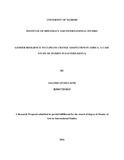| dc.description.abstract | In an African continent experiencing ever growing effects of Climate Change more so in Sub-Saharan Africa‟s Arid and Semi-Arid Lands (ASALs), how have African citizens managed to cope. What role has gender played in this adaptation and how have women in Africa built resilience to climate change adaptation. What role does gender play in Climate Change resilience and what strategies and policies have African governments put in place to help women adapt to climate change? These are the major questions that guided this study which sought to examine „Gender resilience to climate change adaptation in Africa: A case study of women in Eastern Kenya’
Through an analysis of primary and secondary data, the study found out that climate change has had far reaching effects in Kenya resulting in rising temperatures, new tropical diseases and pests, flash floods and drought among others negatively affecting human, livestock and agricultural performance as well. The study also found that women are the most affected gender when it comes to bearing the effects of climate change. This was due to various reasons like their biological composition, the socially assigned roles that women perform in the society and the economic activities they women perform. The study found that both national and county governments have made some effort to tackle the effects of climate change with little being done to aid women in adapting to climate change yet they are the most affected gender. Government efforts include, building dams, providing drought resistant seeds to farmers, carrying out civic education and seeking the support of development partners in coming up with solutions to mention but a few. The study reached the conclusion that the African continent has not adequately involved women in coming up with solutions to gender resilience and adaptation of climate change and ended by recommending a number of measures to address the situation including; calling on African governments to carry out evidence based research on the role of gender in climate change politics, come up with gendered policies/strategies on climate change and calling on donors and development partners to include the gender component in their engagement with African governments on climate change issues. | en_US |



